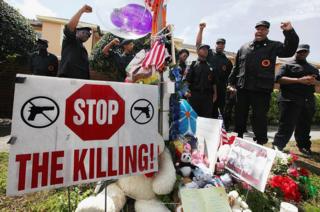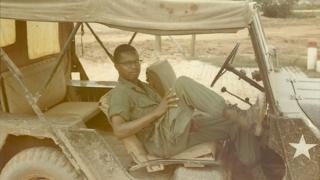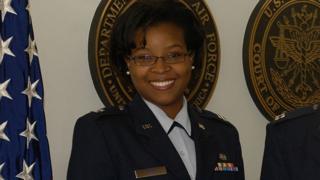IMAGE COPYRIGHTGETTY IMAGES
African Americans have been fighting in conflicts for the US since the Revolutionary War. But despite their sacrifices, the reverence that America usually sets aside for its warriors has not been so forthcoming.
At the end of 2018, US Air Force veteran Janice Jamison was outside the town hall in Augusta before Stacey Abrams, then running for Georgia governor, arrived to talk at an event for a local veterans group for women.
Suddenly Jamison found herself confronted by five white men who began protesting that Abrams didn't understand veterans.
Jamison, who works for the organisation whose members are predominantly African American, tried to reason with the men but found herself being harangued by one man on the subject of veterans' needs.
"I said to him, 'Well, sir, for you to tell me what I need as a veteran, have you ever been in uniform?"
The man - who she later discovered to be a white nationalist - admitted he had not, and appeared visibly embarrassed, she tells the BBC.
Such encounters have some concerned that the current politically and racially charged climate is exacerbating existing problems about how black Americans are treated both in the military and as veterans.
"On paper I made a seamless transition, I got accommodation in New York through a friend, found a job," 26-year-old Richard Brookshire says about leaving the infantry.
But he says over the course of a year his emotional state slowly deteriorated until he couldn't function, and months of depression led to a suicide attempt.
"Part of it was coming to terms with the social and racial climate of the country I was coming back to," explains Brookshire, whose African-American father served in the military as did his mother after emigrating to the US from Haiti.
"I'd been inspired to join and serve under the first black president. I'd even interned for Obama's presidential campaign in Sanford, Florida - and a month after I got back from Afghanistan in 2012 that was where Trayvon Martin was killed."
There would be further racially charged tragedies and tensions for Brookshire to contemplate, set against the Black Lives Matter movement emerging in response to Martin's death. In August 2014 riots erupted in Ferguson after the fatal shooting of Michael Brown by a police officer.
Meanwhile, white supremacists became increasingly bold and public, culminating with the tragedy of Charlottesville in 2017 when a woman was hit and killed by a car that drove into crowds protesting a white supremacist rally.
Brookshire was also unnerved when he discovered how his military career had paralleled that of James Jackson, an Afghanistan veteran and self-proclaimed white supremacist who in 2017 targeted and killed a black homeless man in New York.
"We both went to Fort Leonard Wood, got stationed together in [Germany], deployed to Afghanistan at the same time, got out of the army within a month of each other—it felt like we shadowed one another for those four years," Brookshire says.
Brookshire's personal experience as a veteran, coupled with what he saw going on in the country, motivated him to co-found the Black Veterans Project (BVP). It aims to help preserve the historical legacy of America's 2.5 million black veterans while also advocating against racial inequities in the military and post-service.
"The military is the first to say we are a reflection of society. Well, that's the good and the bad," says Kyle Bibby, BVP's other co-founder, who left the Marines as a captain after six years.
"In the military I saw lots of confederate flag tattoos that made me very uncomfortable, and the sorts of personalities that you might expect with them."
He says that a sense of neglect or "assumptions being made about me" made him "deeply examine my blackness."
Although it is unclear where exactly the Memorial Day tradition originated, Bibby notes that one of the earliest commemorations followed the Confederate surrender, when recently freed slaves gathered on 1 May, 1865, to consecrate a burial site for 250 Union soldiers who had died in the fight to grant African Americans their freedom.
During the Civil War, more than 180,000 African Americans wore the Union Army blue.
Another 30,000 served in the Navy, and 200,000 served as workers in military-support roles. More than 33,000 were killed.
When World War I broke out, 380,000 black men heeded the call of the black intellectual WEB Du Bois to enlist in the segregated army in the hope that doing so would empower greater opportunities for black Americans on the home front.
Today, black Americans account for 17% of America's 1,340,533 active-duty personnel - including those serving in the US Coast Guard - according to the Pew Research Center.
"The military has always been popular in the black community," says Paul Matthews, who served as a platoon surgeon in Vietnam before founding Houston's Buffalo Soldiers National Museum, which examines the role of African-American soldiers during US military history.
Such hopes haven't been borne out by the data.
Protect Our Defenders, an advocacy group, released a 2017 report highlighting how black service members were treated more harshly by the military's judicial system.
Black soldiers were 61% more likely than white soldiers to face court martial, the military judicial proceeding for more serious offences. That percentage was 40% for black sailors and 32% for black Marines.
Black airmen were 71% more likely than whites in the Air Force to face court martial or non-judicial punishment, discipline meted out for less serious offences.
"I seem to be getting inundated with black female officers who are being disciplined for dumb stuff," says Coretta Gray, who spent 13 years as an officer in the Air Force Judge Advocate General's Corps, the military's branch for military justice and military law, and continues to consult on cases.
"Often those sorts of issues are sorted out at unit level before it has to go anywhere, and I'd contend that usually whites get the benefit of that more than blacks," Gray says.
"It may well be unconscious bias, as opposed to anything institutional, as you tend to help those within your social group and who you are more familiar with."
But she also suspects that the current mood in America has something to do with why she is seeing an increase in these types of disciplinary cases.
"People are feeling more emboldened to act out their biases," Gray says. "It's an inflection moment - there's this atmosphere emboldening people to show who's in charge and how they are going to handle things."
Unequal justice for black troops is likely influenced by a lack of diversity in the military hierarchy, observers note. In 2016, about 78% of military officers were white, while 8% were black.
At the same time, many black veterans say that the military does a far better job of embracing egalitarianism than the rest of US society.
"Growing up in the '80s in Connecticut and New York, you didn't see many prominent black people," says 38-year-old Sadiki Harriott, who is originally from Jamaica, and served eight years in the US army as an IT specialist.
"There were no business owners - people did things like my dad who was a plumber. But once I got into the military I saw all types of races in leadership roles," he adds.
"One of the most influential people in my life was Master Sergeant Alan Dewitt - he was the first black person who showed me what I might achieve: he was an impressive guy; he got a degree in the military and drove a Mercedes."
Due to his IT skillset, Harriott says he had little trouble transitioning to the civilian realm, landing a well-paid job in cyber security. But his veteran success story is only one side of the coin.
Bibby notes how many blacks leaving the military often go in two totally different directions: some are boosted into the middle class and a better station than they had before, while others fall entirely off the ladder.
Today roughly 45% of all homeless veterans are African American, despite only accounting for 10.4% of the US veteran population, according to the National Coalition for Homeless Veterans. The US Department of Housing and Urban Development (HUD) estimates that 40,056 veterans are homeless on any given night.
"A lot of it has to do with education. If you joined before finishing high school and leave the military before doing your 20 years, the chances of not being successful when you come out are higher," Matthews says.
"And if you come back to an urban environment, there aren't many jobs, there's just one VA [Veterans Affairs] centre where it's hard to get appointments. That adds to negative experiences."
As with African American experiences in the civilian realm, there is a precedent for black veterans being treated differently.




Comments